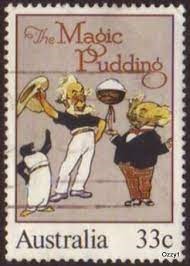You may recall Norman Lindsay’s book “The Magic Pudding”. The title character is a magical pudding named Albert which, no matter how often he is eaten, always regenerates to be eaten again. Sadly, I think that the myth of endless profits from property have encouraged not only governments but many other players in the property industry to regard property as a magic pudding.
How Real are the Endless Profits?
The first issue to query is how real these endless profits really are? Certainly we read articles in newspapers about celebrities selling their up market property for a million dollar gain in a short space of time. We also see and hear plenty of stories from property investors who have made big gains.
However, I think taking these stories at face value means we are making two (at least) errors.
Firstly, the headline gain seems impressive – but very rarely does anyone include all of the costs – stamp duty, renovations, selling costs and a range of other expenses. Hence, the headline gains are not truly indicative of the profit being made. I’m sure you can think of suburbs with impressive gains in median prices but where it seems every second house has been renovated in the past 5 years. These renovation costs are not reported when the impressive gains are trumpeted.
Secondly, these few impressive results are not the average or typical result. I have a friend that was always boasting about his huge gains on the share market. However his house needed some basic maintenance that was always going to happen ‘soon’. The obvious conclusion, if you think about it, is that he was cherry picking the results he was telling me about. He was not telling about his losses – which given basic maintenance wasn’t done, I believe must have exceeded his gains. Property is the same – we hear about the exceptional results. Don’t make the mistake of thinking these are typical.
Don’t get me wrong – property is a great way to generate wealth. It has been for many years in this country. I believe that the better results are usually related to insight and hard work. On the other hand, I can also tell you stories of investors that have sold properties for less than they paid a decade before. However, I digress – this is a story for another day.
The point is that the perception seems real. Too many of us choose to believe that property owners are making a fortune. The natural extension of this belief is that property owners should share that fortune with us one way or the other.
Victoria’s New Taxes
Certainly, the Victorian Andrews Government seems to believe this.
The recent Victorian budget imposed two sets of changes for property owners.
Firstly, there is a ‘temporary’ 10 year increase in land tax. I have highlighted the word ‘temporary’ because income tax in Australia was a ‘temporary’ war time measure introduced in the 1940’s…. The tax free threshold has been reduced from $300,000 to $50,000. 860,000 property owners will apparently be affected.
It’s worth considering the recent Queensland proposals to introduce a land tax rate based on national property ownership. This was a proposal that was announced and abandoned approximately 100 days later and before it was brought into effect. Recent articles suggest that this led to a 17% drop in investment by property investors in the State of Queensland.
I also know from dealing with clients that land tax is an increasing burden that was already affecting client decisions before these increases.
It will be interesting to see what the impacts of the increase in land tax are. In a low rental yield and increasing interest rate environment it can’t encourage new investment in rental properties.
Secondly, the Andrews Government is ‘abolishing’ stamp duty on commercial and industrial property purchases from 1 July, 2024. Yes – and replacing it with an annual property tax of 1% of the land value for 10 years. Am I being overly cynical in thinking this is actually a misleading headline – and scared that this is the thin edge of the wedge in relation to a broader annual property tax?
Interestingly, they didn’t increase land tax, which increase would more likely be passed onto tenants.
I haven’t seen the detail on this proposal so its not entirely clear how it will work. However, it would seem to be an annual expense to be borne by the property owner. It’s not hard to anticipate that lenders will factor this into the property owner’s cash flows with a resulting decrease in valuations and loan amounts.
The new annual property tax reminds me of the exit stamp duty applied by the NSW government on investment properties in the early 2000’s. This was found to be a brake on the property market and even stamp duty collections and was dropped a few years later.
Again, it will be interesting to see if this provides the economic stimulation that the government uses to justify the change.
Other Players
The Victorian Government isn’t the only player that sees property investors as a flock ready to be fleeced:
- Banks – Does anyone think that interest rates and fees are too low or the major banks are too efficient?
- Builders – standard domestic building contracts unfairly favour builders with disastrous results for property owners not only when builders go into liquidation;
- Real Estate Agents – if you read the standard sale authority you will notice it doesn’t impose any obligation on the agent to use their best endeavours to get the best price but does entitle them to their commission once a binding offer is received;
- Councils and Government Authorities – Delays, regulations and fees seem to be always increasing. Ever looked at how much water rates, to name one, have increased over the last 20 years? and
- Tenant Advocates – Even after the recent raft of new renter rights, the wish list for new obligations for residential rental providers is quite imposing.
Lewis O’Brien & Associates
My belief is that the last 30 or even 60 years have been an amazing period for property price growth. Increasing population, increasing employment and income, falling interest rates (until recently) and increasing government regulation have all contributed to this.
However, it is hard to see the next 10 years being this kind to property investors.
In my opinion, property investors need to react in a number of ways:
- Active Investment – I believe that buy and hold forever will not work as well in the future. Successful investors will target a prospective area, seek ways to add value to the property and then exit. That is, a more active investment strategy will, if done well, deliver superior results;
- Good Advice – contracts and the legal system continue to get more complex. As a property investor you need to better understand the contracts you sign and get advice on what changes are required to protect your interests; and
- Education – you need to continue to find ways to do continually improve what you do – cheaper, faster, better. If you don’t improve, as the market gets tougher you will effectively be going backwards.
Lewis O’Brien & Associates stands ready to assist you to improve as a property investor – whether you are buying your first home or developing a large apartment block or subdivision – or anything in between. We are truly independent as we don’t pay commissions to or receive commissions from banks, builders or real estate agents.
If you are about to sign a contract – getting the contract reviewed by a lawyer that is on your side is a simple and cost effective way to protect yourself and help to ensure that:
- you are aware of what you are signing
- it is fair; and
- common problems are minimised.
To contact us and arrange a review – please click here.
Increasingly, we also offer a range of special conditions for standard contracts that you can purchase by clicking here.
If you aren’t thinking of investing in, selling or developing property, but know someone that is please share this article with them.

Lewis O’Brien
Your Preferred Property Lawyer
